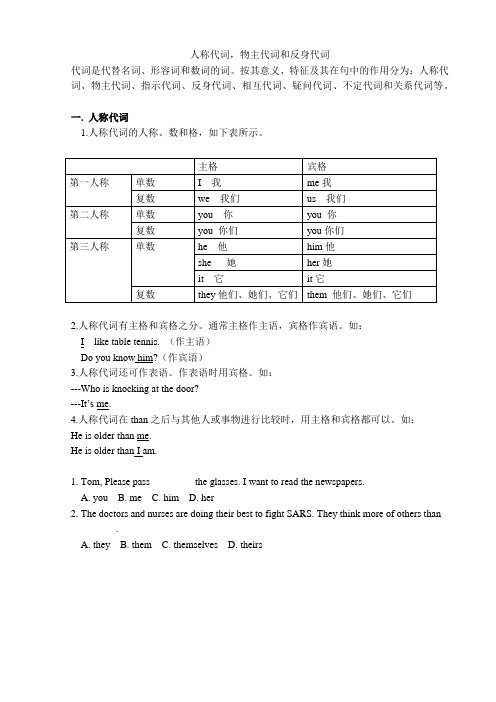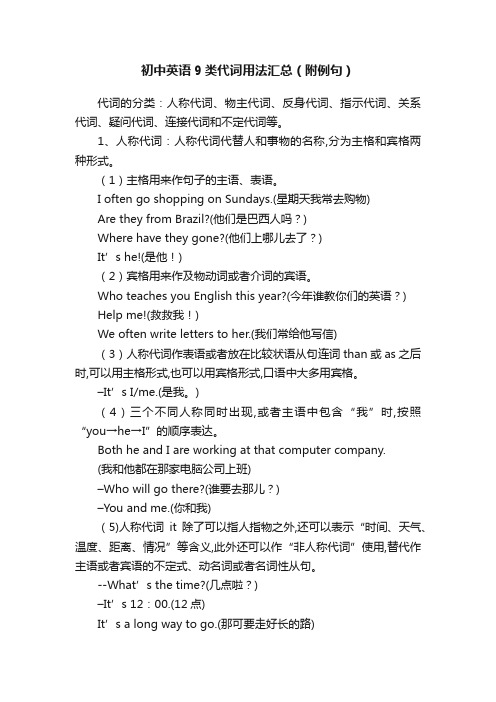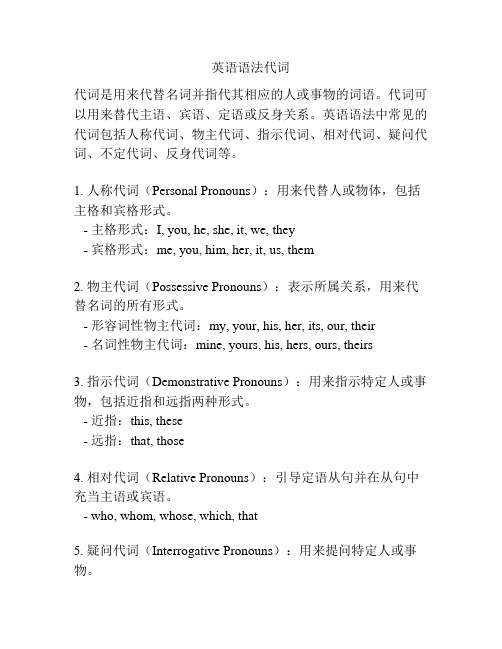英语人称代词、物主代词、反身代词讲解
人称代词、物主代词、反身代词

人称代词、物主代词、反身代词1)人称代词的主格在句子中做主语2)人称代词为单数时,按第二人称。
第三人称、第一人称排列。
(若是承担责任的,第一人称应在前面)例如:You, she and I are good friends. 你、她和我是好朋友。
3)人称代词为复数时,按第一人称、第二人称、第三人称排列。
例如: We you and they are playing soccer together.我们、你们和他们一起踢足球。
B.人称代词的宾格在句子中作宾语或在介词后、动词后作宾语。
C.形容词性物主代词1)形容词性物主代词相当于形容词,在句中只能用作定语,后面必须跟名词。
例如: Is that your bike? 那是你的自行车吗?2)与形容词一起修饰名词时,形容词性物主代词要放在形容词前面。
例如:his English books 他的英语书3)当名词前有形容词性物主代词修饰时,不能再用冠词a, an或the来修饰名词。
例如: That is my bike. 那是我的自行车.4)当名词前有形容词性物主代词修饰时,不能再用指示代词this, that, these或those来修饰名词。
例如: Their computers are here. 他们的电脑在这儿。
D.名词性物主代词1)名词性物主代词=形容词性物主代词+名词, 可做主语,表语或宾语。
例如: This is your pen. Mine is in my pencil case.这是你的钢笔。
我的在包里。
2)名词性物主代词用于双重所有格中,即“a/an+名词+of+名词性物主代词”例如: He is a friend of mine. 他是我的一个朋友。
E.反身代词1)反身代词作宾语,位于及物动词或介词后。
例如:The boy teaches himself English. 这个男孩儿自学英语。
2)做主语或宾语的同位语,用于加强语气,也可以放在主语之后或句尾。
英语人称代词、物主代词、反身代词讲解和习题练习

英语人称代词、物主代词、反身代词《人称代词:要讲英语人称代词,咱们先要知道什么叫代词。
代词(pronoun)是指代或替代名词或名词词组的词类,包括人称代词、物主代词、反身代词、相互代词、指示代词、疑问代词、关系代词和不定代词。
表格(1))打个比方,主人邀请宾客,主格就像主人,宾格就像宾客。
主格在动词前面,宾格在动词或介词后面。
1. 人称一致人称代词作主语通常要与随后的动词保持人称的一致。
例如:I am a teacher.You are a student.He is a doctor.She is a nurse.It is a computer.*2.数的一致人称代词应与它的先行项在单、复数形式上保持一致。
例如:Jenny is a nurse. She works at our school clinic.Here are a few TV sets for sale. They are all made in Japan.You, Mike and Andy have finished your work. You can go.3.性的一致单数第三人称代词有阳性、阴性和中性之分,它们的使用决定于所指对象的自然性别。
John didn’t find us, so he left.[Jane hasn’t been back, so we are waiting for her.That vase is valuable. It is more than 300 years old.如果是类指,则代词和物主限定词可用he/his:A teacher should offer his students challenging projects.5.格的选择人称代词作主语用主格,作宾语用宾格,表示“所有”用属格。
I teach him Chinese.He teaches me English.&This is my bag, that one is yours.人称代词在介词之后常用宾格:I brought some story books for them.They are talking about me.Most of us like learning English.人称代词在动词be之后常用宾格:Who is it-It’s me.If I were him, I would not do that thing..★It 可以有许多用法,表示:a. 某样东西:Where’s my map I left it on the table.b. 抽象事物:You saved my life. I shall never forget it.c. 不知性别的孩子:What a beautiful baby!—Is it a boyd. 某种感觉或情况:Where does it hurt How is it going with youe. 是谁:Who is it(that)—It’t me.f. 时间、日期等:What time is it –It’s eight o’clock.》g. 天气、环境:It’s raining.h. 距离等:How far is it to New York --It is 800 kilometers.例句:1、I 和me.我是一名学生。
物主代词、指示代词、反身代词

B.each
C.both
D.every
2._____D____ of the teachers are kind in our school.
A.Every B.Each
C.Either D.All
3.—_________hat is this?
—It's____D_____.
A.Whose,me
B.who,mine
4.Their classroom is bigger than __o_u_r_s__(我们的).
5.The man fell off his bike and hurt__h__im__s_e_lf___(他自己).
课时训练
1.We go home_____D____six days.
A.all
起不同作用。以“我”为例:
You and I are the same age.(主语) 你和我年龄一样大。
He caught me by the arm.(宾语) 他抓住我的手臂。
This isn't my watch.(定语) 这不是我的表。
反身代词
表示“我自己”、“你自己”、 “他自己”、“我们自己”、 “你们自己 ”和“他们自己”等的代词,叫 做如“: 反Sh身e w代as词ta”lk。ing to herself.
—Oh,it's not_________.It's___B______.
A.hers, your
B.mine,Elsa's
C.your's,he's
D.his,my
【例5】 —Can I come this evening or tomorrow morning?
初中英语人称代词,物主代词和反身代词讲解复习资料

人称代词,物主代词和反身代词代词是代替名词、形容词和数词的词。
按其意义、特征及其在句中的作用分为:人称代词、物主代词、指示代词、反身代词、相互代词、疑问代词、不定代词和关系代词等。
一. 人称代词1.人称代词的人称、数和格,如下表所示。
2.人称代词有主格和宾格之分。
通常主格作主语,宾格作宾语。
如:I like table tennis. (作主语)Do you know him?(作宾语)3.人称代词还可作表语。
作表语时用宾格。
如:---Who is knocking at the door?---It’s me.4.人称代词在than之后与其他人或事物进行比较时,用主格和宾格都可以。
如:He is older than me.He is older than I am.1. Tom, Please pass ________ the glasses. I want to read the newspapers.A. youB. meC. himD. her2. The doctors and nurses are doing their best to fight SARS. They think more of others than _______.A. theyB. themC. themselvesD. theirs二.物主代词1.表示所有关系的代词叫物主代词。
物主代词分形容词性物主代词和名词性物主代词如下表所示。
2.形容词性物主代词的作用相当于形容词,可在句中作定语。
例如:Our teacher is coming to see us.This is her pencil-box.3. 名词性物主代词的作用相当于名词,在句中可用作主语、宾语和表语。
Our school is here, and theirs is there.(作主语)--- Is this English-book yours? (作表语)--- No. Mine is in my bag.I've already finished my homework. Have you finished yours? (作宾语)反身代词英语中用来表示"我自己","你自己","他自己","我们自己","你们自己"等意义的代词称为反身代词,也有人称之为自身代名词,其形式如表所示。
初中英语9类代词用法汇总(附例句)

初中英语9类代词用法汇总(附例句)代词的分类:人称代词、物主代词、反身代词、指示代词、关系代词、疑问代词、连接代词和不定代词等。
1、人称代词:人称代词代替人和事物的名称,分为主格和宾格两种形式。
(1)主格用来作句子的主语、表语。
I often go shopping on Sundays.(星期天我常去购物)Are they from Brazil?(他们是巴西人吗?)Where have they gone?(他们上哪儿去了?)It’s he!(是他!)(2)宾格用来作及物动词或者介词的宾语。
Who teaches you English this year?(今年谁教你们的英语?)Help me!(救救我!)We often write letters to her.(我们常给他写信)(3)人称代词作表语或者放在比较状语从句连词than或as之后时,可以用主格形式,也可以用宾格形式,口语中大多用宾格。
–It’s I/m e.(是我。
)(4)三个不同人称同时出现,或者主语中包含“我”时,按照“you→he→I”的顺序表达。
Both he and I are working at that computer company.(我和他都在那家电脑公司上班)–Who will go there?(谁要去那儿?)–You and me.(你和我)(5)人称代词it除了可以指人指物之外,还可以表示“时间、天气、温度、距离、情况”等含义,此外还可以作“非人称代词”使用,替代作主语或者宾语的不定式、动名词或者名词性从句。
--What’s the time?(几点啦?)–It’s 12:00.(12点)It’s a long way to go.(那可要走好长的路)It took him three days to clean his house..(打扫屋子花了他三天的时间)It is very clear that the public want to know when these men can go into space(很显然,公众想知道这些人什么时候能进入太空)2、物主代词:说明事物所属关系的代词,分为形容词性和名词性两种。
英语语法代词

英语语法代词代词是用来代替名词并指代其相应的人或事物的词语。
代词可以用来替代主语、宾语、定语或反身关系。
英语语法中常见的代词包括人称代词、物主代词、指示代词、相对代词、疑问代词、不定代词、反身代词等。
1. 人称代词(Personal Pronouns):用来代替人或物体,包括主格和宾格形式。
- 主格形式:I, you, he, she, it, we, they- 宾格形式:me, you, him, her, it, us, them2. 物主代词(Possessive Pronouns):表示所属关系,用来代替名词的所有形式。
- 形容词性物主代词:my, your, his, her, its, our, their- 名词性物主代词:mine, yours, his, hers, ours, theirs3. 指示代词(Demonstrative Pronouns):用来指示特定人或事物,包括近指和远指两种形式。
- 近指:this, these- 远指:that, those4. 相对代词(Relative Pronouns):引导定语从句并在从句中充当主语或宾语。
- who, whom, whose, which, that5. 疑问代词(Interrogative Pronouns):用来提问特定人或事物。
- who, whom, whose, which, what6. 不定代词(Indefinite Pronouns):指代不确定人或物体的代词。
- some, any, no, all, each, every, few, many, several, someone, anyone, no one, everyone, etc.7. 反身代词(Reflexive Pronouns):表示动作的反身关系。
- myself, yourself, himself, herself, itself, ourselves, yourselves, themselves以上是英语语法中常见的代词,它们在句子中扮演着重要的角色,可以使句子更加简洁明了。
人称、物主、反身代词(含解析)
人称、物主、反身代词(含解析)一、代词的概念1、定义:代词是代替名词的一种词类。
大多数代词具有名词和形容词的功能。
2、分类:英语中的代词,按其意义、特征及在句中的作用分为:人称代词、物主代词、反身代词、指示代词、疑问代词、关系代词和不定代词等。
二、人称代词1、人称代词定义:表示“我,你,他,她,它,我们,你们,他们”的词叫做人称代词。
人称代词分主格和宾格两类,有单、复数之分。
如:We are the best、我们是最棒的。
Please give us more time to finish it、请给我们更多的时间来完成它。
2、人称代词形式:人称代词第一人称第二人称第三人称单数复数单数复数单数复数主格Iweyouyouhesheitthey宾格meusyouyouhimheritthem3、人称代词的用法:1)、主格:做主语。
如:You are good students、你们是好学生。
2)、宾格:做宾语。
I love you、我爱你。
如:She is looking at you、她正在看你。
3)、人称代词的语序:当几个人称代词并列充当主语时,单数形式(二、三、一)You, he and I复数形式(一、二、三)We , you and they第三人称男女两性并用时,男先女后He and she4)、 it 的用法:(1)、指前文提到过的事物。
如:This isn’t my book、It’s Dufu’s、这不是我的书。
它是杜福的。
(2)、指代时间/季节/天气/距离。
如:Which season is it? 现在是什么季节?It’s spring now、现在是春天。
What’s the weather like today? 今天天气怎样?It’s hot、今天很热。
How far is it? 那里有多远?It’s10 kilometers、10千米。
(3)、特殊句型It’s time to do sth、该做、、、、、、的时间了如:It’s time to go to bed、该睡觉了。
英语中的代词有哪些
英语中的代词有哪些下面是店铺整理的一些英语中的代词的用法,以供大家学习参考。
英语中的代词有哪些代词分为九类:人称代词、物主代词、反身代词、相互代词、指示代词\疑问代词、连接代词、不定代词、关系代词。
大多数代词具有名词和形容词的作用。
1、人称代词(1)人称代词作主语用主格,作宾语、表语用宾格,但应注意以下4中情况:①作主语的人称代词如果孤立地使用于无谓语动词的句子中,或在这种句子中与动词不定式连用,常用宾格。
—Does any of you know where Tom lives?—Me.What! Me (to)play him at chess? No!②句子中代词作宾语或宾语补足语时,与所替代的名词在人称、数、格在意义上一般要保持前后一致。
The thief was thought to be he.(the thief是主格,故用he代替)They took me to be her.他们误以为我是她。
(me是宾格,故用her替代)③作表语人称代词一般用宾格,但在强调句型中,被强调部分代词的格不变。
I met her in the hospital.→It was her who I met in the hospital.④在比较级的句子中than、as后用主格、宾格都可以。
如:He is taller than me(I).但在下列句中有区别。
I like Jack as much as her.=I like both Jack and her.I like Jack as much as she.=I like Jack and she likes him, too.(2)两个以上的人称代词并列,其次序排列原则:①在并列主语中,“I”总是放在最后,排列顺序为:二三一(人称)。
宾格me也一样。
You ,she and I will be in charge of the case.Mr.Zhang asked Li Hua and me to help him.②第三人称,男女两性并用,男先女后。
(完整)初中英语代词讲解
第三章 代词:代词的分类:英语中代词分为:人称代词、物主代词、反身代词、指示代词、关系代词、疑问代词、连接代词和不定代词等等。
第一节 人称代词、物主代词、反身代词1、人称代词:人称代词代替人和事物的名称,分为主格和宾格两种形式。
(1)、主格用来作句子的主语、表语。
如: I often go shopping on Sundays.(星期天我常去购物) /Are they from Brazil?(他们是巴西人吗?) / Where have they gone?(他们上哪儿去了?) / That ’s it.(就那么回事) / It ’s he!(是他!) (2)、宾格用来作及物动词或者介词的宾语。
如:Who teaches you English this year?(今年谁教你们的英语?) / Help me!(救救我!) / We often write letters to her.(我们常给他写信) (3)、人称代词作表语或者放在比较状语从句连词than 或as 之后时,可以用主格形式,也可以用宾格形式,口语中大多用宾格。
如:--Who is it?(是谁?) –It ’s I/me.(是我。
) (4)、三个不同人称同时出现,或者主语中包含“我”时,按照“you →he →I ”的顺序表达。
如: Both he and I are working at that computer company .(我和他都在那家电脑公司上班) –Who will go there ?(谁要去那儿?) –You and me .(你和我)(5)、人称代词it 除了可以指人指物之外,还可以表示“时间、天气、温度、距离、情况”等含义,此外还可以作“非人称代词”使用,替代作主语或者宾语的不定式、动名词或者名词性从句。
如:--What ’s the weather like today?(今天天气怎样?)—It ’s fine.(天气晴好) / --What ’s the time?(几点啦?) –It ’s 12:00.(12点) / It ’s a long way to go.(那可要走好长的路) / It took him three days to clean his house.(打扫屋子花了他三天的时间) / It is very clear that the public want to know when these men can go into space.(很显然,公众想知道这些人什么时候能进入太空) / We found it very difficult to learn a foreign language well .(我们发觉要学好一门外语是非常困难的)2、物主代词:说明事物所属关系的代词,分为形容词性和名词性两种。
英语人称代词、物主代词、反身代词讲解
英语人称代词、物主代词、反身代词英语人称代词、物主代词、反身代词总表:人称代词:要讲英语人称代词,咱们先要知道什么叫代词。
代词(pronoun)是指代或替代名词或名词词组的词类,包括人称代词、物主代词、反身代词、相互代词、指示代词、疑问代词、关系代词和不定代词。
表格(1)表格(2)词前面,宾格在动词或介词后面。
1. 人称一致人称代词作主语通常要与随后的动词保持人称的一致。
例如:I am a teacher.You are a student.He is a doctor.She is a nurse.It is a computer.2.数的一致人称代词应与它的先行项在单、复数形式上保持一致。
例如:Jenny is a nurse. She works at our school clinic.Here are a few TV sets for sale. They are all make in Japan.You, Mike and Andy have finished your work. You can go.3.性的一致单数第三人称代词有阳性、阴性和中性之分,它们的使用决定于所指对象的自然性别。
John didn’t find us, so he left.Jane hasn’t been back, so we are waiting for her.That vase is valuable. It is more than 300 years old.如果是类指,则代词和物主限定词可用he/his:A teacher should offer his students challenging projects.5.格的选择人称代词作主语用主格,作宾语用宾格,表示“所有”用属格。
I teach him Chinese.He teaches me English.This is my bag, that one is yours.人称代词在介词之后常用宾格:I brought some story books for them.They are talking about me.Most of us like learning English.人称代词在动词be之后常用宾格:Who is it?-It’s me.If I were him, I would not do that thing.★It 可以有许多用法,表示:a. 某样东西:Where’s my map? I left it on the table.b. 抽象事物:You saved my life. I shall never forget it.c. 不知性别的孩子:What a beautiful baby!—Is it a boy?d. 某种感觉或情况:Where does it hurt? How is it going with you?e. 是谁:Who is it(that)?—It’t me.f. 时间、日期等:What time is it ? –It’s eight o’clock.g. 天气、环境:It’s raining.h. 距离等:How far is it to New York? --It is 800 kilometers.例句:1、I 和me.我是一名学生。
- 1、下载文档前请自行甄别文档内容的完整性,平台不提供额外的编辑、内容补充、找答案等附加服务。
- 2、"仅部分预览"的文档,不可在线预览部分如存在完整性等问题,可反馈申请退款(可完整预览的文档不适用该条件!)。
- 3、如文档侵犯您的权益,请联系客服反馈,我们会尽快为您处理(人工客服工作时间:9:00-18:30)。
英语人称代词、物主代词、反身代词英语人称代词、物主代词、反身代词总表:人称代词:要讲英语人称代词,咱们先要知道什么叫代词。
代词(pronoun)是指代或替代名词或名词词组的词类,包括人称代词、物主代词、反身代词、相互代词、指示代词、疑问代词、关系代词和不定代词。
表格(1)表格(2)词前面,宾格在动词或介词后面。
1. 人称一致人称代词作主语通常要与随后的动词保持人称的一致。
例如:I am a teacher.You are a student.He is a doctor.She is a nurse.It is a computer.2.数的一致人称代词应与它的先行项在单、复数形式上保持一致。
例如:Jenny is a nurse. She works at our school clinic.Here are a few TV sets for sale. They are all make in Japan.You, Mike and Andy have finished your work. You can go.3.性的一致单数第三人称代词有阳性、阴性和中性之分,它们的使用决定于所指对象的自然性别。
John didn’t find us, so he left.Jane hasn’t been back, so we are waiting for her.That vase is valuable. It is more than 300 years old.如果是类指,则代词和物主限定词可用he/his:A teacher should offer his students challenging projects.5.格的选择人称代词作主语用主格,作宾语用宾格,表示“所有”用属格。
I teach him Chinese.He teaches me English.This is my bag, that one is yours.人称代词在介词之后常用宾格:I brought some story books for them.They are talking about me.Most of us like learning English.人称代词在动词be之后常用宾格:Who is it?-It’s me.If I were him, I would not do that thing.★It 可以有许多用法,表示:a. 某样东西:Where’s my map? I left it on the table.b. 抽象事物:You saved my life. I shall never forget it.c. 不知性别的孩子:What a beautiful baby!—Is it a boy?d. 某种感觉或情况:Where does it hurt? How is it going with you?e. 是谁:Who is it(that)?—It’t me.f. 时间、日期等:What time is it ? –It’s eight o’clock.g. 天气、环境:It’s raining.h. 距离等:How far is it to New York? --It is 800 kilometers.例句:1、I 和me.我是一名学生。
__I___ am a student.妈妈喜欢我。
Mother likes ___me___.2、We 和us.我们是中国人。
____We___ are Chinese.父母爱我们。
Parents love __us____.3、you 人称代词最容易记住的。
(你能翻译下列句子吗?试一试!)你是一名学生。
You are a student. 我喜欢你。
I love you. 你们是学生。
You are students 我爱你们。
I love you.4、你能推出she 和her的位置吗?她是一名护士。
__She____ is a nurse.你能帮助她。
You can help _her_____.5、He和him他是我的朋友。
____He__ is my friends. (想想用he还是him呢?)我想和他一起玩。
I want to play with ____him__.6、it 的用法。
-Where is my car?-___It__ is over there.指天气It is raining outside.指气候It is cold in Harbin.指时间-What time is it ?-It’s six o’clock.7、they和them.______They_ are listening to the radio.There are some cats, I like _them____ very much.物主代词物主代词分为形容词性物主代词和名词性物主代词:而名词性物主代词(mine/yours/his/hers/its/ours/theirs则相单于形容词性物主代词+名词,故其后不必加名词。
如:Is this your book?No,it isn’t, it’s hers.(her book)These are my books. These books are mine.This is my cup. Yours is the blue one.My husband’s father is a doctor. Mine is a lawyer.★名词性物主代词可用于“双重所有格”结构:My sister makes friends wherever she goes. Jack is just a friend of hers.★Yours 常常写在信末:Yours faithfully, yours truly, yours sincerely, yours, yours ever例句:你知道形容词性物主代词和名词性物主代词的区别吗?1、.形容词性物主代词起形容词的作用,用在名词前。
This is my book. 这是我的书。
We love our motherland. 我们热爱我们的祖国。
2、名词性物主代词起名词的作用。
Look at the two pencils. The red one is yours and the blue one is mine.看那两支铅笔,红的是你的,蓝的是我的。
He likes my pen. He doesn't like hers.他喜欢我的钢笔。
不喜欢她的。
3、名词性物主代词=形容词性物主代词+名词反身代词典型用法例举反身代词在中学英语中的用法极其灵活,搭配频频出现,为帮助同学们复习和积累,特将中学英语中出现的反身代词用法归纳如下:1.用以加强语气,表示亲自。
If one wants knowledge of a skill, one must take part in it oneself.He went there himself the day before yesterday.2. 与典型介词搭配,构成固定短语,表达特定含义。
1) (all) by oneself 单独地When I was young, I had to make a living all by myself.Would you go there by yourself?2) to oneself 独自享用When he eats in a restaurant, he likes a table to himself.3) for oneself 为自己;独自One shouldn’t live for himself alone.You must find it out for yourself.4) of oneself自动地The door opened of itself.5) between ourselves私下里Just between ourselves, I don’t think much of him.6) in oneself本身The materials in themselves were not poisonous.7) beside oneself喜怒时发狂She was beside herself with joy.8) by itself自然地The machine will start by itself in a few seconds.3. 与典型动词搭配,构成固定短语。
1) be not oneself身体不好I’m not quite myself today.(I’m unwell.)2) enjoy oneself玩得很痛快3) help oneself to sth. 随便吃Please help yourself to some fish.4) teach oneself sth.自学When he was young, he taught himself advanced mathematics.5) accustom oneself to 习惯于He quickly accustomed himself to this new way of life.6) devote oneself to致力于I am determined to devote myself to the cause of education.7) adapt oneself to适应She quickly adapted herself to the new climate.8) adjust oneself to调整;适应The body quickly adjusts itself to changes in temperature.9) behave oneself举止得体Please behave yourselves.10) dress oneself穿衣服He is too young to dress himself.11) seat oneself就坐He seated himself in the chair and began to read the novel.12) make oneself heard / understood / seen / known / believed让自己被(别人)听见/听懂/看见/认识/相信He raised his voice to make himself heard by all.13) find oneself无意识中发现自己At last, we found ourselves in a pleasant park with trees providing shade and sat down to eat our picnic lunch.14) express oneself清楚表达自己的意思He is still unable to express himself in English.15) talk to oneself自言自语16) come to oneself 苏醒。
